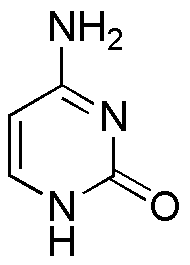Cytosine is widely utilized in research focused on:
- Genetic Research: As one of the four primary nucleobases in DNA and RNA, cytosine plays a crucial role in genetic coding and is essential for studies in genomics and molecular biology.
- Pharmaceutical Development: Cytosine derivatives are explored in drug design, particularly in antiviral and anticancer therapies, where they can inhibit viral replication or cancer cell growth.
- Biotechnology: In synthetic biology, cytosine is used in the development of synthetic nucleic acids, which can lead to advancements in gene editing technologies like CRISPR.
- Diagnostics: Cytosine is involved in the design of diagnostic assays, including PCR (Polymerase Chain Reaction), which is crucial for detecting genetic diseases and pathogens.
- Food and Agriculture: Research into cytosine's role in plant genetics can enhance crop resilience and yield, contributing to agricultural biotechnology and food security.
General Information
Properties
Safety and Regulations
Applications
Cytosine is widely utilized in research focused on:
- Genetic Research: As one of the four primary nucleobases in DNA and RNA, cytosine plays a crucial role in genetic coding and is essential for studies in genomics and molecular biology.
- Pharmaceutical Development: Cytosine derivatives are explored in drug design, particularly in antiviral and anticancer therapies, where they can inhibit viral replication or cancer cell growth.
- Biotechnology: In synthetic biology, cytosine is used in the development of synthetic nucleic acids, which can lead to advancements in gene editing technologies like CRISPR.
- Diagnostics: Cytosine is involved in the design of diagnostic assays, including PCR (Polymerase Chain Reaction), which is crucial for detecting genetic diseases and pathogens.
- Food and Agriculture: Research into cytosine's role in plant genetics can enhance crop resilience and yield, contributing to agricultural biotechnology and food security.
Documents
Safety Data Sheets (SDS)
The SDS provides comprehensive safety information on handling, storage, and disposal of the product.
Product Specification (PS)
The PS provides a comprehensive breakdown of the product’s properties, including chemical composition, physical state, purity, and storage requirements. It also details acceptable quality ranges and the product's intended applications.
Certificates of Analysis (COA)
Search for Certificates of Analysis (COA) by entering the products Lot Number. Lot and Batch Numbers can be found on a product’s label following the words ‘Lot’ or ‘Batch’.
*Catalog Number
*Lot Number
Certificates Of Origin (COO)
This COO confirms the country where the product was manufactured, and also details the materials and components used in it and whether it is derived from natural, synthetic, or other specific sources. This certificate may be required for customs, trade, and regulatory compliance.
*Catalog Number
*Lot Number
Safety Data Sheets (SDS)
The SDS provides comprehensive safety information on handling, storage, and disposal of the product.
DownloadProduct Specification (PS)
The PS provides a comprehensive breakdown of the product’s properties, including chemical composition, physical state, purity, and storage requirements. It also details acceptable quality ranges and the product's intended applications.
DownloadCertificates of Analysis (COA)
Search for Certificates of Analysis (COA) by entering the products Lot Number. Lot and Batch Numbers can be found on a product’s label following the words ‘Lot’ or ‘Batch’.
*Catalog Number
*Lot Number
Certificates Of Origin (COO)
This COO confirms the country where the product was manufactured, and also details the materials and components used in it and whether it is derived from natural, synthetic, or other specific sources. This certificate may be required for customs, trade, and regulatory compliance.


